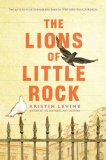
 The Lions of Little Rock
The Lions of Little RockReview posted November 17, 2012.
G. P. Putnam's Sons, 2012. 298 pages.
Starred Review
2012 Sonderbooks Stand-out: #6 Other Children's Fiction
This book is set in Little Rock in 1958. The schools have been ordered to integrate, and a few bold teens forced the issue. So now the mayor responds by closing the high school.
Marlee's sister Judy is going into eleventh grade, so she's going to have to go away to be able to go to school, leaving Marlee on her own. Marlee has a lot of fears. She doesn't like to talk. Not to other people, anyway. But then a new girl comes to her middle school, and Marlee makes a wonderful new friend, a friend who helps her speak up and face the things she's afraid of.
Marlee caught my sympathy early, because she uses numbers to steady herself. I also enjoyed her way of looking at the people in her life:
You see, to me, people are like things you drink. Some are like a pot of black coffee, no cream, no sugar. They make me so nervous I start to tremble. Others calm me down enough that I can sort through the words in my head and find something to say.
My brother, David, is a glass of sweet iced tea on a hot summer day, when you've put your feet up in a hammock and haven't got a care in the world. Judy is an ice-cold Coca-Cola from the fridge. Sally is cough syrup; she tastes bad, but my mother insists she's good for me. Daddy's a glass of milk, usually cold and delicious, but every once in a while, he goes sour. If I have to ask one of my parents a question, I'll pick him, because Mother is hot black tea, so strong, she's almost coffee.
When Marlee's new friend Liz turns out to be black, trying to pass for white, Marlee's life turns upside-down. She has to examine things like true friendship, what's right and what's wrong, as well as facing her fears.
This novel about civil rights isn't quite like any other I've read. It works just as well as a novel about a girl learning to face her fears and examine her friendships as much as it works to cast light on a particular time in history.
